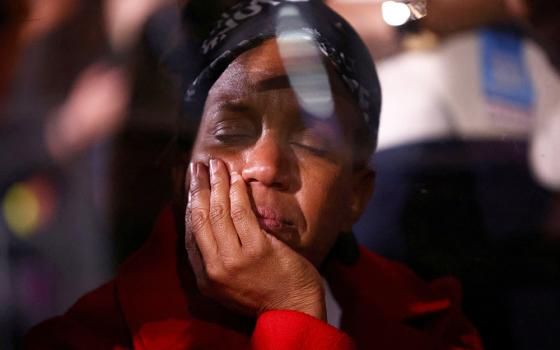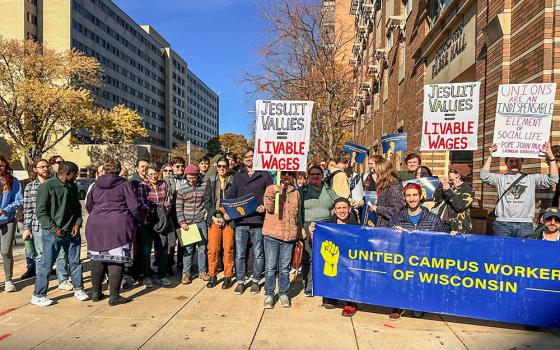Reading Marie Collins’ statement, published here at
Empathy has its limits. I cannot imagine what it feels like to have been sexually abused as a child, especially by a priest. We all have had secrets, some more dark than others, that we would not like to shine a light on, but to have one’s personhood violated by someone whose vocation is to care with the love of Jesus Christ for his parishioners, well, that is a pain that I cannot even imagine.
Nor can I imagine the courage to continue fighting for the protection of children, knowing that every case you hear about, every obstacle you face in your attempts to reform the Church and to root out this sin, every interview you give to the press, will reanimate those dark memories of abuse. This residual pain is evident when Collins writes, “I have been asked about the Commission discussion and vote last Saturday at our Plenary. Why the silence and why have I not walked away? I have fought for transparency in the Church and in this case we must have transparency also, it is only fair to all those who feel they have once more been betrayed but the Church.” Even being at the Vatican, surrounded by so many clergy, must be an emotional challenge.
The most frustrating thing, surely, must be encountering obstruction to one’s efforts to help the Church. After all, it is clear by now, and was long clear to most, to anyone with eyes to see that the clergy sex abuse crisis has done more damage to the Catholic Church than any other single event in the last fifty years. A secular culture? That pales by comparison to the betrayal and despair that the sex abuse crisis caused.
And those are the obvious examples of the damage caused by the crisis. Notre Dame professors Nicole Garnett and Peg Brinig wrote an important book Lost Classroom, Lost Community analyzing the decline of social capital in neighborhoods where a Catholic school had closed. Ostensibly, that topic had nothing to do with the clergy sex abuse crisis. But, what did they find? The leading indicator of whether or not a Catholic school had closed in a given neighborhood was not demographic change in that neighborhood, not violence in the area, not poverty amongst the population. No, the leading indicator was whether or not the parish to which the school belonged had a priest who was an abuser.
Against all the original evil and evil consequences, Marie Collins and the members of the papal commission stand resolute. They are making progress. As she writes, “[The commission members] are working towards the implementation throughout the world of best practice in safeguarding, education in the area of abuse and justice for survivors. Policies produced are then recommended to the Pope. They are not pawns complicit in a PR exercise but good people with the safety of children at heart.” I imagine that some fellow survivors have hurled the accusation at Collins that she is complicit in a PR exercise. Think about that: The charge of betrayal leveled against someone who was so badly betrayed. Collins has courage and stamina of a kind I can’t even imagine.
Collins has something else too: the work at hand and the support of her fellow commission members, most especially Cardinal Sean O’Malley. In three of the four dioceses +O’Malley has served – Fall River, Palm Beach and now Boston – coping with the clergy sex abuse crisis has been a central task in his ministry, indeed, the reason he was sent to these dioceses was because they were in crisis and his commitment to helping the victims heal, protecting children now and in the future, and demanding justice for victims were all needed. To the rest of the world, the ways of the Vatican look Byzantine and almost unbelievably slow, but +O’Malley got this commission approved and working in record time. He, like Collins, has faced plenty of naysayers and obstructionists and only the high regard in which he is held by the pope and many cardinals has allowed the important work of the commission to prosper.
I believe that anyone who was victimized by a priest has the right to be angry for the rest of their lives. They have the right to be skeptical of the claims of Church authorities that the issue is being confronted. But, I do not believe they have the right to question the conscience of Marie Collins. Her determination to continue to work with the papal commission tells me all I need to know about her and about the commission. Yes, there are obstacles, and she is not shy about naming them. But, the work the commission has begun is real and the progress they are making is real too.
There is more work to be done. One thing we have learned from this crisis is that there will never be a time when we can lessen our sense of vigilance when it comes to the protection of children. Sadly, there will likely be powerful curial officials who deny the problem or wish to sweep it under the rug for some time to come. But, if the commission were really just a PR exercise, if the long, arduous work of training bishops and priests in best practices was not happening, if the obstructionists continually had the upper hand, can anyone doubt that Collins would have long since resigned?




